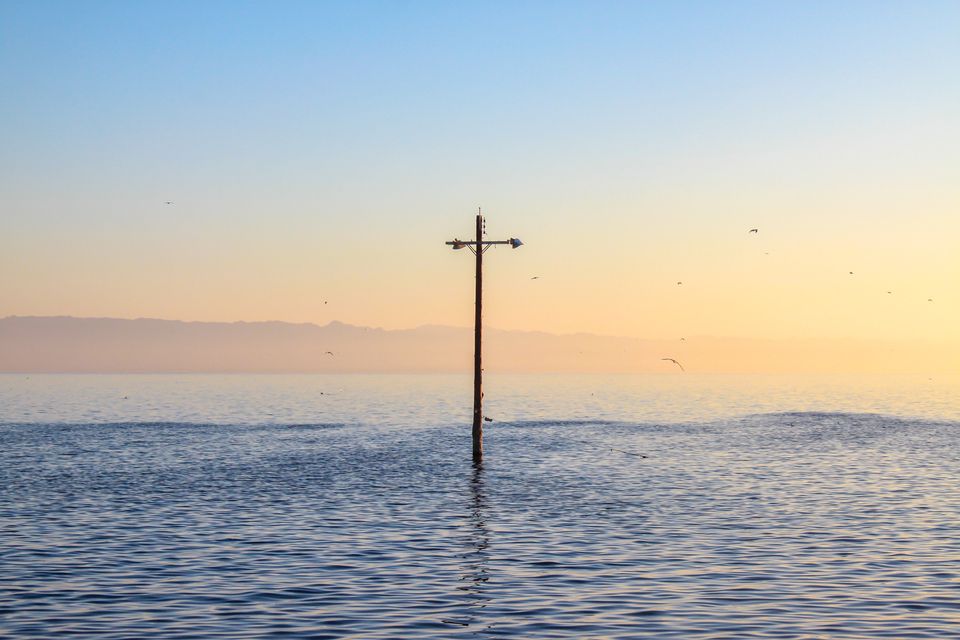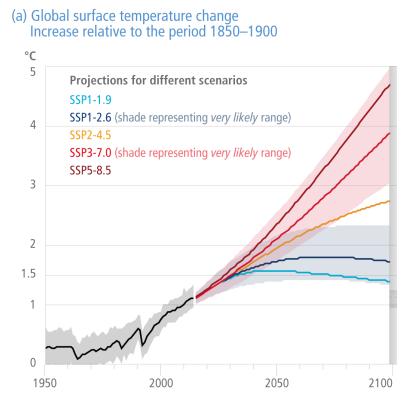Climate Change: Faster and Worse

Content Warning: This newsletter will speak in frank terms about the IPCC report and its findings. While we have engaged with this material in the past, the nature of the latest report paints a more difficult picture than previously understood. This could be a very taxing subject, and if you are concerned that engaging with this material will harm your mental health, please do not read further.
The Intergovernmental Panel on Climate Change released their sixth assessment report back in February, and I'm afraid there was next to no good news. Of particular concern to me were three observations, and a fourth that isn't exactly in the report but is just where we're at:
- The likelihood of a 2°C increase in temperature by 2040.
- The likelihood of severe impacts if we overshoot 1.5°s-worth of emissions.
- The warning of runaway feedback loops should we overshoot.
- The certainty that we will need negative carbon emissions to remain at or below 1.5°C increase in temperature.
Let's break these down, one by one.
2°C by 2040
I've said for a while that every time you see a new report on climate change, you can bet that the timeline has shifted–and it's always in the wrong direction. That's happened again, but now we're starting to see some really bracing changes. The last IPCC report stated that we're looking at 3°C by the time we get a handle on things off in the future. Which was, and is, very bad. What's changed is that their near-term prediction for temperature increases has made room for some alarming highs.

SSP stands for Shared Socioeconomic Pathway, which basically just means which garden fork we, as a planet, take going forward. The lower SSPs naturally represent decreases in emissions, decreases in abusive consumption, and overall increase in equality and care for the natural world. The opposite end is literally just dubbed "The Highway," meaning capitalism and fossil fuel usage. Under even the breeziest of pathways, we could see an increase in temperature near 2°C. The problem is that we're almost certainly not going to be on one of those nice, green SSPs. No, we're headed for the red.
For comparison, to show you how stark this sudden curve toward 2C is, look at a piece from just last year by NOAA. At the end, it states that we might be looking at, on the low side of a worst-case scenario, an increase in temperature of 5°F (just shy of 3°C) by the end of the century. The latest model shows us potentially hitting 3°C by 2060. This is an incredibly alarming acceleration–I mean, I might still be alive by then, provided I don't get eaten by the last grizzly bear.
An increase in temperature of 2°C by 2040 means that in 18 years–the age of majority for those of you with newborns–we will be living in a world that is, on average, 3.6°F warmer. For some regions, taking this as an average, that means no snow where there used to be snow in the winter. It means summers that are literally unbearably hot for longer and longer stretches of the season. It means more sporadic rainfall, more frequent drought, and, paradoxically, more flooding. It means longer fire seasons, and drier forests. It means more ambient energy for storms of all kinds to feed on, and grow.
Severe Impacts in a +1.5C world
Part of the problem with climate change, even to this day, is that it is hard to pin such a vast subject matter down, even with hard data. They call climate change a hyperobject for a reason. Jordan Peterson, an idiot, recently said that we're wrong on climate change because climate change is "everything," and we don't account for "everything" in our models. There is a grain of truth in this bad, disingenuous lie, though. Climate change is so vast that when you say something like "on average, 3.6°F warmer" and "It means more sporadic rainfall, more frequent drought, and, paradoxically, more flooding" your brain might just interpret this as circus music. 3.6°F might feel like a nicer winter to you, after all.
What's more, there is rarely one tumultuous event for us to look at in apprehension. Climate disasters, taken globally, may be tempered by their location as something improbable–it would be difficult for me, where I am, to be affected by a forest fire. I think this muddies the water in a way that, say, war in Ukraine doesn't. I can't point from 2°C to a sudden increase in hurricanadoes, or the appearance of Godzilla. Except that we're currently at around 1°C and change, here and now in 2022, and I have written climate change disaster news on this platform until my fingers cramped. I think that what these disasters become, then, so frequent and omnipresent, is simply weather.
Which is a decent way of looking at it, if you'll bear with me. In a world that's 1.5°C warmer, most of these issues simply become your daily noise. Get up in the morning and expect ashfall from fires in California on your daily commute. You have to bypass the first three gas stations you pass because the line at the pumps is tailing into the street thanks to a hurricane in the Gulf. The AC at the office is out because your city is suffering from an overburdened electrical grid in the midst of a heatwave. And still, you're at work on time, and you're doing whatever this job is. It sounds like hell, but your boss will say it's just weather. Meanwhile, species are going extinct. Kids cooling off in ponds die from brain-eating amoebas. The fishing industry is going dry. The world tenses up for a possible new pandemic every few years. Thousands die around the globe from heat in the summer and cold in the winter–in places you wouldn't expect, like British Columbia and Texas. The price of food doesn't skyrocket–no, that would be too alarming–instead, it rises, like heat. Steadily, until more and more of your budget is spent on a simple loaf of bread. But still, it's just weather.
Feedback Loops
We've talked about feedback loops and runaway climate change before. What we haven't really touched on is the "minor" feedback loop that the IPCC report refers to as "cascading" effects or impacts, like how higher average temperatures result in more tree die-offs, which creates more risk of wildfires, which later increases the odds of disastrous flooding. There's that, and then there's the feedback loops we've talked about before, like the melting of the Greenland Ice Sheet and the release of methane from permafrost in Siberia. This IPCC report pushes up the point of no return on some of these feedback loops to 1.5°C, after which nothing is guaranteed. If our world continues on the trajectory it's currently barreling down, we'll definitely exceed 1.5°C and then almost definitely trigger a loop or two, after which the planet begins to act like a dryer with a brick thrown in it.
Once the switch gets thrown on runaway climate change, thanks to methane release, ice melt, and eventually all of the above, the issue ceases to be in our control. Anthropogenic climate change, in that sense, is at least something we theoretically could do something about. But once the permafrost is gone, and the Amazon is a prairie, we'll begin to move away from the catastrophes on the 5s and 9s in the morning report to decidedly more existential and inescapable threats. We're on the brink with these feedback loops as it stands, and it will not take much to trigger a reaction that pushes climate change from "the end of the world as we know it" to a more comprehensive "the end of the world."
*Of course, having written this post a few weeks ago, there is more news: both the Arctic and Antarctica were wildly hotter than they normally are. This is really, really alarming. A heatwave this extreme means we're on the brink of feedback loop activation, if we're not already in the beginning stages.
We Need a Miracle, and God's Away on Business
My last point is that scientists are more and more certain that we have already crossed the threshold–that emissions in the air today and guaranteed tomorrow will create warming over 1.5°C. We can be almost as certain of this as we can be sure that the sun will rise tomorrow. This means that in order to remain below 1.5C, we will need to use carbon capture technology. It's sort of like NASA saying that in order to get to the Moon we have to first invent pixie dust.
We've talked about carbon sequestration here before. It's a boondoggle. "Net zero" initiatives have leaned on negative emissions for some time, and they have been a shiny part of many a corporation's bid to remain relevant and keep their consumers and stockholders guilt-free as climate plans become essential even to the dirtiest fossil fuel companies. But while the technology does technically exist in the world, it exists in the same way that jet packs exist: yeah, they're awesome in theory, but there's limited real-world application and they're mostly meant to distract you from something else. The world's biggest carbon sequestration facility currently sucks up about 800 cars'-worth of CO2 a day. There are roughly a billion cars on the road today. And, just in case having a million of those facilities sounds feasible, cars make up less than a third of emissions (for comparison's sake, there are only 37,000 McDonald's in the world).
Working Backwards
If you take the conclusions of this newsletter backwards, they go like this: a 1.5°C increase in temperature is impossible to avoid; 1.5°C means runaway climate change is likely; 1.5°C+ climate change means severe impacts in the near-term; we're going to reach 2°C+ by 2040. I'm not sure how to express to you how dire this is. The great big existential anxiety we all feel–especially the younger folks–the worry that we're hurtling toward a cliff at the end of the world? This is the cliff.
If we're bound for this end–and we are, I'm sorry–we have got to be thinking, actively, about how we intend to survive and how we intend to steward the planet as best we can once everything falls apart. Because it will. There is going to come a point at which society as it exists today is going to break down, and while it may feel simpler and easier to think of the whole of humanity as packing it in after that and bowing out around one last campfire, that's not what's going to happen. In the wake of civilization there will come other ways of living, and if we're not ready to step up I can promise you they will not be better.
The work of mutual aid, of solidarity, of simple acts of kindness–they may seem so small as to be meaningless. But they're not. The only way through this with any semblance of a future for ourselves and the planet is if we begin to build a structure now, from within the scaffolding of what's collapsing. When your neighbor can't afford groceries, you've got to be there to help them. When your apartment floods, you've got to be able to crash on your neighbor's couch. When the police tell you to form an orderly queue for the bread lines and then start clearing out an encampment in the park across the street, you've got to be able to rally the hungry to defend the hungry. Power doesn't take time to convince or persuade–it simply crushes, and the people clinging to their power as things start to fall apart will use it like a truncheon. Community, camaraderie, on the other hand, has to be demonstrated, proven, established. So start making yourself that community. Don't let there be an alternative to that.
